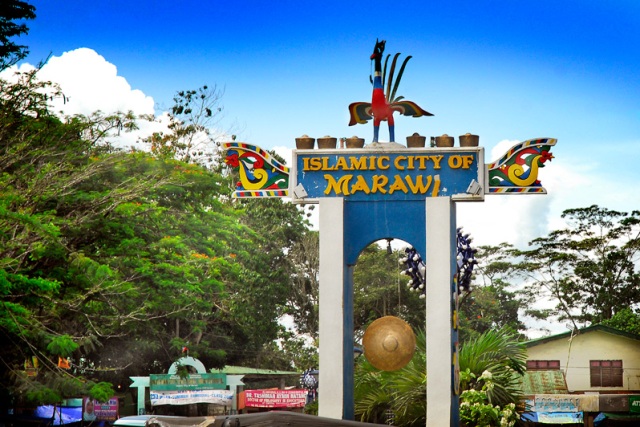‘Maute holding on to 20% of Marawi’

IS praises Marawi siege
ZAMBOANGA CITY, Philippines – Maute and Abu Sayyaf militants in Marawi are holed up only in four barangays of the city, contrary to claims by the Islamic State (IS) that the local terror group now has control over almost the entire city, Western Mindanao Command (Westmincom) chief Lt. Gen. Carlito Galvez said yesterday.
“It only comprises 20 percent of the whole of Marawi City and it’s getting smaller every day,” Galvez said, referring to the four barangays where some 150 to 200 militants and their Abu Sayyaf allies have taken defensive positions.
That is at least double the area that the military had given a week ago, when it had said the terrorists were holed up in a sliver of urban terrain equal to just 10 percent of the city and shrinking. There are 96 barangays in Marawi.
At Malacañang, presidential spokesman Ernesto Abella said the situation could have been worse had the government not acted fast enough. “The early action of the military and the government has actually preempted their plans to be able to capture the city. So we need to credit that. Yes, there were (intelligence reports) but it was something that had to be vetted and to be authorized properly,” Abella said in a press briefing.
“Were it not for the early and decisive action of the military, then it would have been worse,” he added.
Almost the entire population of about 200,000 fled after the militants tried to overrun the city, but the military believes that beyond the checkpoints now fencing off its main roads there are still some 300 to 600 civilians trapped or being held hostage.
Galvez said the military’s relentless offensive – including airstrikes – has greatly weakened the terrorists’ fighting capability.
He said the militants are now concentrated in barangays Marinaut, Lulut, Mapandi and in the Bongolo commercial district.
Air and mortar attacks on enemy positions continued yesterday.
On Sunday, OV-10 bronco planes bombarded terrorists’ defensive positions, including high rise structures being used as snipers’ nests.
The military said at least 58 soldiers, 26 civilians and 202 terrorists have been killed since fighting began late last month.
At least five policemen and five Christian civilians trapped in Barangay Daguduban escaped to safer zones in the west bank of Agus River now under government control, according to the Joint Coordination, Monitoring, and Assistance Center (JCMAC).
Fourth week
Fighting in Marawi City entered its fourth week yesterday with military officials conceding that troops were struggling to loosen the grip of Islamist fighters on downtown precincts despite relentless bombing.
Military spokesman Brig. Gen. Restituto Padilla said the urban terrain was hampering the army’s progress because the rebels had hunkered down in built-up neighborhoods, many of them with civilians they had taken as human shields.
Hundreds of other civilians were still trapped in the ruins of the town and – facing capture, starvation or bombardment from above – several have braved sniper fire to dash across a bridge to safety. Some were shot dead, a few made it alive.
Asked when the fighting would end, Padilla said: “I can’t give you an estimate because of compounding developments faced by ground commanders.”
The military had set Monday, Independence Day, as a target date to flush out the militants, both local and foreign fighters who have pledged allegiance to the Islamic State (IS).
Philippine flags were raised on Monday but heavy gunfire resumed early yesterday.
President Duterte, who declared martial law in Mindanao on May 23 – hours after several hundred fighters overran parts of the city and tried to seal it off to create an Islamic caliphate – did not show up at any Independence Day event.
Duterte is best known for a brutal war on drugs since he took office a year ago, and he has suggested that funding for the Islamist militants came from the narcotics trade.
Some media reports highlighted the absence of the President at a time of serious conflict, but a spokesman said he was tired and needed to rest.
The Philippines has been fighting twin insurgencies from Maoist-led rebels and Muslim separatists in Mindanao for nearly 50 years.
Critics say military action is not enough to bring peace to a region that has long suffered from political neglect and poverty.
‘Complicated’
Abella defended the military from criticism that it had failed to meet its target of ending the Marawi siege by Independence Day, saying the situation on the ground was “complicated.”
“The fight continues. I just said, we will not stop until it’s finished. June 12 was a working deadline set by the military. However, as we have very well seen, the issue is more complicated on the ground,” he said.
“But considering the fact that they’ve done great advances, I think we need to credit that. The President has been very supportive and is quite emphatic that the Marawi siege should be totally settled,” he added.
Abella said the terrorist threats in Mindanao, not just in Marawi City, should be “completely addressed.”
“Enemy resistance continues to dwindle and enemy held areas are getting smaller as troops advance. Various critical sectors in peripheral areas are now cleared,” he pointed out.
Despite the gains in Marawi, the government is concerned about reports that the IS has ordered more attacks during the Muslim holy month of Ramadan.
Abella said the government is taking the reports “with concern and continued decisiveness.”
He said the latest atrocity committed by the terrorists was the killing of five civilians Tuesday morning.
Citing accounts of the five survivors of the massacre, Abella said the Maute terrorists knocked on the door of a house where 18 people had been trapped for days.
The civilians tried to escape using the back door going to the river. The terrorists followed and indiscriminately fired at them.
Abella also said that there were no official reports yet about the supposed capture of 60 policemen and the death of Maute brothers Omar and Abdullah.
He also assured the public that those who use martial law to commit abuses would be punished.
“Concerns over alleged excesses will be quickly addressed and all abuses will be stopped and punished,” he said.
‘Pure propaganda’
The seizure of Marawi has alarmed Southeast Asian nations which fear IS – on a backfoot in Iraq and Syria – is trying to set up a stronghold in Mindanao that could threaten their region.
The ultra-radical group’s news agency, Amaq, said the Philippine military had “completely failed” to take back Muslim-majority Marawi.
“Islamic State fighters are spread in more than two-thirds of Marawi and tighten the chokehold on the Philippine army that is incapable of maintaining control of the situation,” it said.
“Children of the caliphate in eastern Asia, we congratulate you for taking Marawi,” IS spokesman Aboulhassan al-Mouhajer said.
He also praised the attacks in Iran’s parliament complex that killed 17 people.
Padilla branded the Amaq report as “pure propaganda.” He said about 100 militants were still fighting, down from the estimated 400-500 who stormed the city.
Former military chief Rodolfo Biazon told ABS-CBN television on Monday that the government seemed to be struggling to control the situation because rebel forces could move freely in and out of town, raising the prospect of reinforcements.
“Marawi has porous boundaries. You see them in one place of Mindanao today, you see them in another place tomorrow,” said Biazon, also a former legislator.
The IS Amaq news agency said that at least 200 government troops had been killed and many had abandoned their posts, leaving behind weapons that were seized by the militants.
Reuters said IS released a video showing the insurgents fighting and what it said was the execution of six Christians who were shot simultaneously in the back of the head. Reuters was not able to independently confirm the authenticity of the video.
In Iran, 17 people were killed and dozens wounded when armed men and suicide bombers attacked Tehran’s parliament complex and the shrine of revolutionary leader Ayatollah Ruhollah Khomeini on June 7, the first strikes claimed by the group in Iran.
The five attackers were killed. Mouhajer urged “caliphate soldiers” to continue their actions during Ramadan in Iraq and Syria.
He also called for attacks in Europe, America, Australia, Russia, Egypt, Yemen, Libya, Tunisia and Algeria. – Alexis Romero
- Latest
- Trending




























